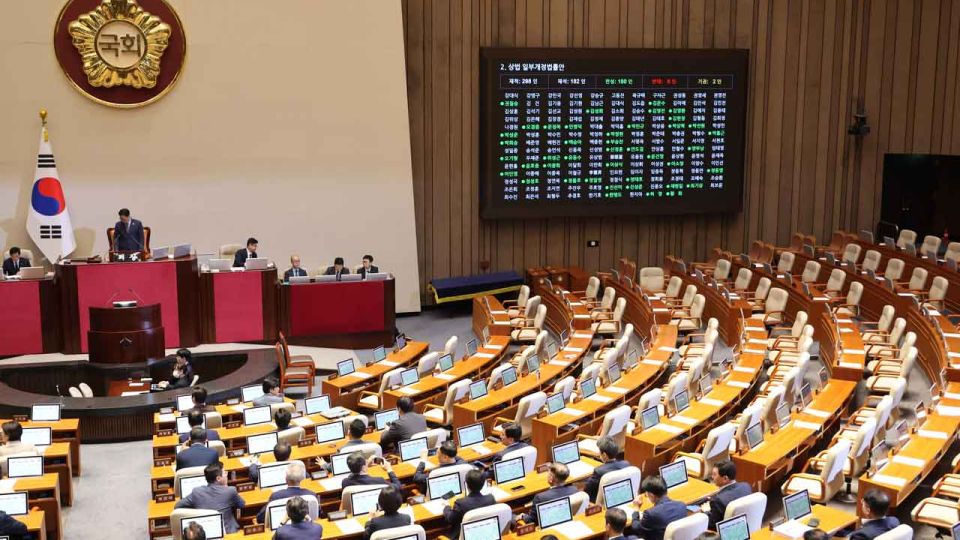August 26, 2025
SEOUL – Korea’s National Assembly has passed sweeping corporate governance reforms that strengthen minority shareholder rights and curb the voting power of controlling families, deepening a clash between investors eager for change and conglomerates warning of instability.
The legislation, championed by the ruling Democratic Party of Korea, cleared the plenary session with 180 votes in favor and two abstentions from the minor New Reform Party, while the main opposition People Power Party lawmakers staged a boycott in protest.
Under the new rules, large listed companies with assets exceeding 2 trillion won ($1.44 billion) must adopt a cumulative voting system, and the number of audit committee members elected separately from controlling shareholders will increase from one to at least two. These measures were not included in an earlier, bipartisan revision passed last month.
Cumulative voting enables shareholders to concentrate multiple votes on preferred director candidates, increasing the influence of minority investors. Meanwhile, the expanded separate election of audit committee members limits the dominance of major shareholders over board oversight.
The legislation builds on a July amendment that extended directors’ fiduciary duties to all shareholders, part of President Lee Jae Myung’s broader plan to reform corporate governance and address the so-called Korea discount, where domestic stocks have traditionally traded below their fundamental value.
This latest reform comes as the Democratic Party-controlled Assembly passed a series of high-profile bills this month, including measures revamping public broadcaster governance and the “Yellow Envelope” bill, which secures bargaining rights for subcontracted workers.
The bill also strengthens board oversight through a broader application of the 3 percent rule, which restricts the largest shareholders and related parties to 3 percent of the vote when electing audit committee members.
Previously, the cap applied only to internal directors; it will now extend to independent directors as well.
Lawmakers also agreed to replace the term “outside director” with “independent director,” a symbolic but pointed reminder that directors must act independently of management influence.
Business lobbies voiced alarm.
Korea’s eight major business associations — including the Federation of Korean Industries, Korea Chamber of Commerce and Industry, Korea Enterprises Federation and Korea International Trade Association — issued a joint statement expressing “deep regret” at the reform.
They warned that directors could become overly cautious in the face of shareholder sentiment and potential lawsuits, deterring long-term investments and leaving firms exposed to activist campaigns.
“Aligning the interests of all shareholders is practically difficult,” said one industry official who requested anonymity.
They also criticized the lack of safeguards, such as codifying the business judgment rule to shield directors from liability when acting in good faith or revising Korea’s expansive breach of trust provisions that have historically exposed executives to criminal charges for management decisions.
“Without complementary protections, the strengthened 3 percent rule raises the risk of speculative forces capturing audit committees,” the groups said.
The legislation fulfills a campaign pledge by President Lee, who vowed to lift Korea’s benchmark Kospi toward 5,000 by tackling the “Korea discount” that has long undervalued the nation’s equities.
His Democratic Party pushed the measure through against resistance from the conservative People Power Party, which opposed the 3 percent rule until a last-minute bipartisan compromise.
More contentious proposals — including mandatory cumulative voting for director elections and increasing the number of audit committee members elected separately from controlling shareholders from one to two — were deferred for future hearings.
The current passage follows a failed attempt earlier this year, when an earlier version of the bill passed but was vetoed by then-acting President Han Duck-soo. This time, Lee’s liberal bloc had the numbers to overcome resistance.
For investors, the reform signals a structural shift toward global standards of corporate governance. For Korea’s corporate titans, it marks a tilt toward shareholder primacy at the expense of entrenched management rights — raising the prospect of more litigation, activist pressure and contested boardrooms.
“We agree with the bill’s purpose of revitalizing the capital market and establishing a fairer business environment,” the business groups said. “But the absence of defenses for management rights risks undermining stability and discouraging investment.”
hnpark@heraldcorp.com


